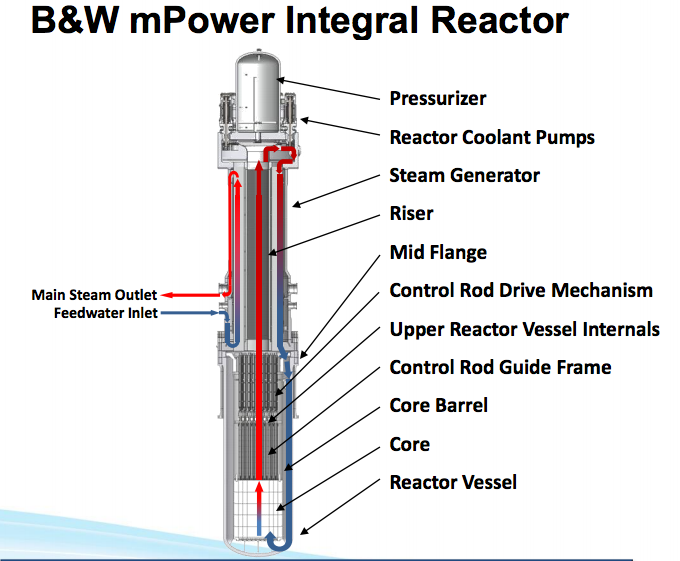New type of small nuclear reactors planned for Tenn., S.C. slammed for wasting taxpayer money

A new type of nuclear reactor the Tennessee Valley Authority (TVA) plans to build at one of its sites in Tennessee has just won a tongue-in-cheek award for wasting taxpayer money.
This week Taxpayers for Common Sense (TCS) bestowed its Golden Fleece Award on the U.S. Department of Energy for giving hundreds of millions of taxpayer dollars to highly profitable companies to build small modular reactors (SMRs). A fraction of the size of conventional reactors, with some as small as a hot tub, SMRs would be manufactured on an assembly line and transported to their destinations by truck, ship or rail.
"The nuclear industry has a tradition of rushing forth to proclaim that a new technology, just around the corner, will take care of whatever problem exists," said Autumn Hanna, TCS senior program director. "Unfortunately, these technologies have an equally long tradition of expensive failure. If the industry believes in small modular reactors and a reactor in every backyard -- great -- but don't expect the taxpayer to pick up the tab."
TVA announced last week that it would pay Charlotte, N.C.-based nuclear equipment company Babcock & Wilcox to complete design work and apply for permission to build an SMR at its Clinch River Site in Oak Ridge, Tenn., the site of an aborted breeder reactor project. The companies plan to submit their license application for the project to the Nuclear Regulatory Commission in 2015, three years later than initially planned.
Though TVA did not disclose the value of the contract, as much as half of it would be paid with public funds from the U.S. Department of Energy (DOE) under a program to promote nuclear innovation. DOE has already provided almost $100 million for SMRs, though their viability remains uncertain, and it's committed up to $452 million over the next five years to fund up to two separate SMR demonstration projects.
In its announcement about the Clinch River project, TVA acknowledged there was uncertainty that it would ever be completed. "As the Clinch River project matures," TVA said, "it will be evaluated at certain progress points to ensure its continuation makes sense for TVA." While TVA is owned by the federal government, it's an independent corporation that derives most of its revenue from electricity sales.
Another SMR project could be coming to South Carolina. Last March, DOE's Savannah River Site nuclear reservation near Augusta, Ga. and Savannah River National Laboratory signed three agreements for public-private partnerships with SMR companies to commercialize the technology. The private companies involved in that project are Holtec International of Delaware, Fluor Corp. of Texas, and Gen4 Energy of Colorado. Another SMR project involving Pennsylvania-based Westinghouse is planned for an Ameren Power site in Missouri.
Meanwhile, nuclear watchdogs are raising concerns because President Obama's expected pick for energy secretary, Dr. Ernest Moniz of MIT, has testified before Congress in favor of SMRs.
In its policy brief on taxpayer subsidies for SMRs, TCS notes that the NRC is still not prepared to license the technology:
In 2008, NRC estimated it would have a regulatory review process in place to license the first SMRs within five years. However, in May 2012 the NRC stated "If an appreciable fraction of total SMR initiatives materialized, it would create an untenable situation for the NRC."
This is because the regulatory framework for licensing SMRs does not fully exist. It has yet to be determined whether many of the proposed qualities of SMRs, such as generation capacity, modularity, and security features, are covered under the current licensing process for new nuclear reactors. Most of all, NRC hasn't decided whether it will license individual reactors or issue a combined license for a multi-reactor facility… .
There are also serious safety and security concerns about SMRs. In an effort to cut costs, the industry has proposed reducing the required number of on-site plant operators, decreasing the size of the emergency planning zone, and cutting back on security checkpoints at SMR plants. Other concerns include long-term radioactive waste storage and the creation of additional targets for terrorist attacks.
"This award should be a wake up call to those who champion such ill-defined projects," said Dr. Stephen Smith, director of the Southern Alliance for Clean Energy, who urged members of Congress to manage public money wisely given current budget woes. "If anything should be sequestered, it should be the pursuit of SMRs at the expense of U.S. taxpayers."
Tags
Sue Sturgis
Sue is the former editorial director of Facing South and the Institute for Southern Studies.
